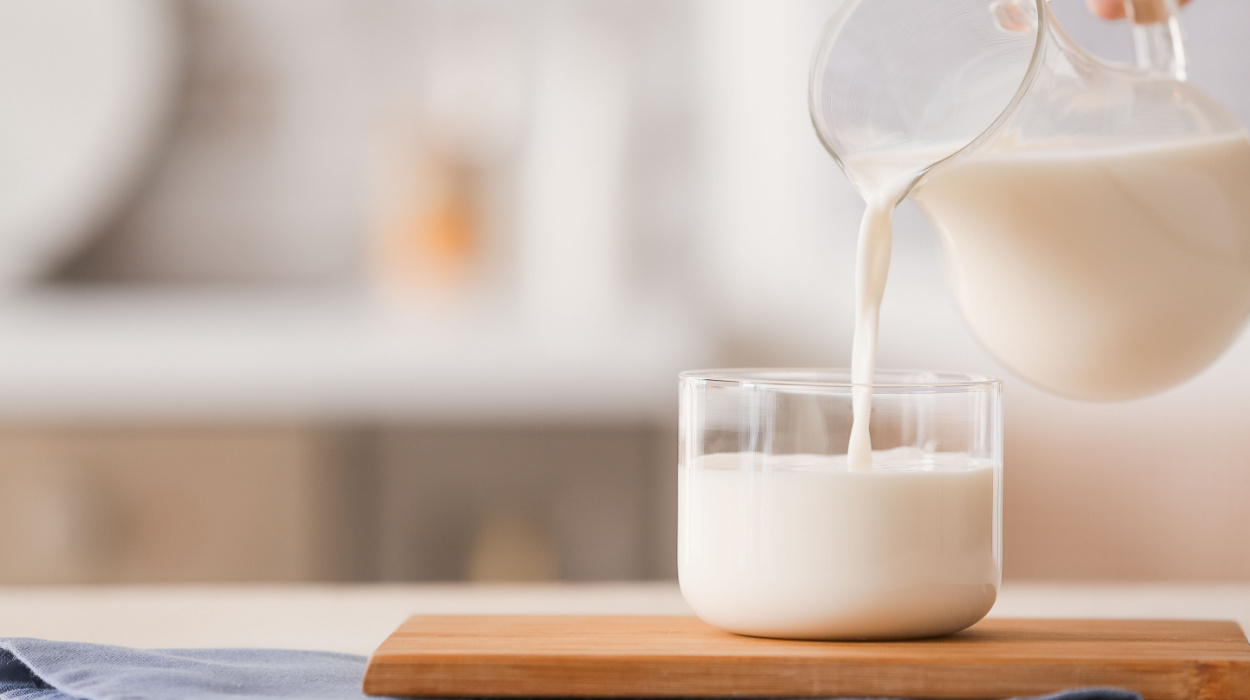Milk is a staple in our diets. As children, we loved to drink one glass of milk a day. This is because milk is renowned for its nutritional value and role in promoting overall health.
However, when it comes to weight loss, do we need it? Some believe it causes weight gain, while others say it can be a valuable addition to weight loss diets.
This article will answer the burning question, “Is milk good for weight loss?” Do you think it can be classified as one of the best belly fat burners? And will it give you a sustainable weight loss?
We will delve into the use of milk in weight management by exploring its nutritional composition, effects on satiety and metabolism, benefits for muscle building, and linkage to gut health. We will also see the considerations of different milk types and which one aligns with weight loss.
Is Milk Good For Losing Weight?
Yes, milk can be part of a weight loss plan, but it depends on the type and quantity you consume.
Low-fat or skim milk is a good source of protein and calcium, with fewer calories than whole milk. These can help with weight loss by providing nutrients without excessive calories. Additionally, the protein in milk can help you feel fuller for longer, potentially reducing overall calorie intake.
If you want to lose weight, incorporating milk into a balanced diet and pairing it with healthy eating habits and exercise can contribute positively to your overall weight loss goals.
Is Milk Good For Weight Loss?
Before we dive into using milk as a weight loss supplement, let’s see an overview of the nutritional composition of cow’s milk. Dairy products contain a mix of macronutrients, including carbohydrates, proteins, and fats. It also has many benefits[1] that cover our overall well-being.
In addition to macronutrients, milk is also rich in essential micronutrients. It contains vitamins such as vitamin D,[2] which is crucial for bone health, and minerals like calcium and potassium. These micronutrients are vital to overall health.
The impact of milk on weight loss largely depends on an overall calorie intake and the context in which milk is consumed. So, is milk good for losing weight? Let’s dig deeper into the potential effects of milk on weight management.
Here are some benefits of milk for weight loss:
High Protein Content

Milk contains two main types of protein: casein and whey.[3] These proteins are great for building lean muscle mass and have a satiating effect, helping you feel fuller for longer periods.
Additionally, research suggests that adequate protein intake[4] can boost your metabolism. The protein in milk aids with calorie burning and ultimately contributes to weight loss.
Calcium Content
Calcium, found abundantly in dairy products, has been studied for its potential role in regulating body weight.[5] Some studies suggest that calcium may aid in the breakdown of fat cells and inhibit their accumulation. However, the direct impact of calcium on weight loss is still a topic of ongoing research.
Some research suggests that adequate calcium intake might aid in fat metabolism[6] and possibly reduce fat absorption, though these effects might be modest. Studies do show that for each 300 mg increase in calcium, 1 kg of body weight is lost.[6] Calcium, in combination with vitamin D, often added to fortified milk, is linked to better weight management.[7]
Low-Calorie Content And Fat Levels
The calorie count of milk varies based on its fat content. Whole milk contains more calories due to its higher fat content than skim or low-fat varieties. If you aim to limit calorie intake, choosing lower-fat milk options can help manage overall calorie consumption without sacrificing essential nutrients.
Milk is also versatile. It can be used alongside other helpful weight loss tools, like using cinnamon to lose belly fat. Cinnamon, for instance, helps regulate blood sugar levels and aids in weight management. Creating a cinnamon-infused milk drink can be a tasty, low-calorie addition to your routine.
Improves Satiety
One key factor in weight management is satiety, the feeling of fullness and satisfaction after a meal. Protein and fat are known to be more satiating than carbohydrates. Milk can help increase satiety levels[8] and potentially reduce calorie intake throughout the day.
Drinking milk or incorporating it into meals can give a feeling of fullness. This feeling of satiety might help reduce overall calorie intake throughout the day, especially when milk is consumed as part of a balanced meal or snack.
Promotes Gut Health

Milk can play a role in promoting gut health and potentially supporting weight loss efforts. Some milk products, like yogurt or kefir, contain probiotics that contribute to a healthy gut microbiome. They contain probiotics such as Lactobacillus acidophilus and Streptococcus thermophilus.
These probiotics are known for their positive effects on digestive health. They help maintain a healthy balance of bacteria in the gut, enhancing digestion and nutrient absorption. Overall, drinking milk can play a role in weight management.[9]
The Nutritional Value Of Milk
As we evaluate milk’s potential for weight loss, it’s important to understand its macronutrient profile. Milk contains a combination of fat, protein, and carbohydrates.
The nutritional composition of milk can also vary based on the type (i.e., cow’s milk, soy milk, or almond milk) and whether it’s fortified with additional vitamins and minerals. Dairy products are considered a nutrient-dense food, providing a range of essential nutrients beneficial for overall health.
Here’s a breakdown of the nutritional value of milk[10] based on a one-cup (249 grams) serving of whole milk:
- Protein: Milk contains high-quality proteins. The protein content is divided into two, including casein and whey. These proteins are considered complete proteins, providing all the essential amino acids necessary for the body. One cup of milk contains about 8 grams of protein.
- Fats: Whole milk contains fats, including saturated fats. They’re an energy source, and a cup of milk contains roughly 8 grams of fat. Low-fat dairy contains 2.32 grams[11] of fat. Skimmed milk has .2 grams of fat.[12]
- Carbohydrates: Milk contains lactose, which is a natural carbohydrate sugar. Its carbohydrate content amounts to 11.5 grams and 12 grams of sugar.
- Calcium: Known for its role in building and maintaining strong bones and teeth, calcium is abundant in milk. It also supports muscle function and nerve transmission. There is about 306 mg of calcium in one cup of milk.
- Vitamin D: Often added to fortified milk, vitamin D helps absorb calcium and improves bone health. One cup of vitamin-D-fortified milk may contain 16% of the daily value for this nutrient. About 2.4 micrograms are in milk, according to the USDA database. Most manufacturers add[13] 100 IU of vitamin D to their milk per cup. One IU equals .025 micrograms.
- The RDA for adults[14] is 15 micrograms or 600 IU.
- Vitamin B12: Important for forming red blood cells and nerve function, milk is a good source of this vitamin, especially for individuals following a vegetarian or vegan diet.
- Potassium: Necessary for maintaining healthy blood pressure and regulating fluid balance, 374 mg of potassium is in 1 cup of milk.
- Riboflavin (Vitamin B2): Essential for converting food into energy and for maintaining healthy skin and vision, .34 mg of riboflavin is present in 1 cup of milk.
Which Milk Is Best For Weight Loss?
When it comes to weight management, the calorie balance is crucial. Knowing how much calorie deficit to lose weight is important. This is why not every milk is best for weight loss.
So, which milk is best for weight loss? Find the table comparing the types below:
We can see that there is a trend in calories from whole milk to the rest. One of the top choices from the table is unsweetened almond milk due to its low-calorie count and high nutrient content.
Almond milk[15] is a plant-based milk almost free of saturated fat and cholesterol, making it suitable for those looking to consume fewer calories and lose body weight. It is also an excellent choice for people who are lactose intolerant.
Opting for low-fat or skim milk can provide essential nutrients without too many calories from fat. However, moderation is key, as even low-fat milk contains calories that can add up if consumed in large quantities. Always consult with a healthcare professional before making any significant changes to your diet plan.
Other Tips To Keep In Mind
We have spoken in detail about the benefits of milk for weight loss efforts. But that’s not all you need to know to ensure fat loss. There is other equally important information to remember for a healthy lifestyle. Here are some additional tips to remember:
Eat A Balanced Diet
More than just milk — a balanced diet encompasses a variety of nutrients from different food groups. Eat enough fresh fruits and vegetables, lean proteins like fish or poultry, whole grains with lots of fiber, and healthy fats. Also, note that portion control is crucial; focus on serving sizes to avoid overeating even healthy foods.
Get Regular Exercise
Consistent physical activity is vital for weight loss. Aim for a mix of exercises like jogging, strength training, and yoga or stretching. Exercise burns calories, boosts metabolism, and enhances overall well-being.
Drink Enough Water
Water is essential for the body’s functions. Drinking enough water[16] helps regulate appetite and can prevent overeating by keeping you feeling full. But do you wonder how much water you should drink to lose weight? Try to drink 1-2 liters per day as guidelines suggest.[17]
Mindful Eating
Mindfulness while eating involves being present and attentive during meals. Chew food slowly and pay attention to hunger cues. This practice helps you recognize when you’re full, preventing unnecessary consumption of extra calories.
Limit Processed Foods And Sugars
Processed foods and added sugars are some of the foods to avoid losing weight. They contain empty calories and contribute to weight gain.[18] Minimize sugary drinks, snacks, and heavily processed foods high in unhealthy fats, sodium, and refined sugars.
Stress Management
Weight gain can be triggered by stress. Incorporate stress-relieving activities[19] into your routine, such as meditation, deep breathing exercises, hobbies, or spending time in nature.
Conclusion
To summarize, milk is beneficial to a weight loss journey when consumed in moderation and as part of a balanced diet. Milk is great, but low-fat or skim varieties provide essential nutrients like calcium and protein without excess calories from fat.
However, we also emphasize that weight loss isn’t solely about a single food or beverage but overall dietary patterns and lifestyle choices. Other helpful ways to lose body fat include regular exercise, hydration, and managing stress. These are key components of a successful weight loss plan.
Remember, personalized approaches and professional guidance are based on individual needs and preferences. So, we advise that you seek professional advice on achieving sustainable and healthy weight management from a registered dietitian.
Frequently Asked Questions
Yes, moderate low-fat or plant-based milk such as soy milk supports weight loss due to its protein content, aiding in satiety and muscle preservation.
Unsweetened almond or skim milk, low in calories and fat, are beneficial choices for weight management due to their nutrient profile. But an added source of protein will be necessary.
Moderate consumption of low-fat or alternative milk is key. Balancing overall diet and exercise is more impactful for losing belly fat than solely avoiding milk.
Nutrient-dense options like almond, oat, or skim milk offer beneficial vitamins and minerals. They also cater to various dietary needs and health considerations.
 Evidence Based
Evidence Based
